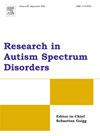What are the experiences and support needs of families of autistic children with Extreme (or ‘Pathological’) Demand Avoidance (E/PDA) behaviours?
IF 2.1
4区 医学
Q1 EDUCATION, SPECIAL
引用次数: 0
Abstract
Background
An increasing number of families are seeking assessment and support for autistic children who present with Extreme (or Pathological) Demand Avoidance (E/PDA) behaviours. However, research suggests the needs of these families may not be well understood or met by services. This study identifies their experiences and support needs, focussing on their interactions with services.
Method
Qualitative, semi-structured, online interviews with 21 parents of child(ren) with a formal diagnosis of autism and E/PDA behaviours. Interviews were analysed using an inductive, reflexive thematic analysis at a semantic level.
Results
Four themes describe the distinct experiences of families: (1) Understanding and acceptance of E/PDA behaviours is lacking; (2) Attributing blame: Judgements of E/PDA behaviours by others; (3) Lack of tailored support for E/PDA behaviours; (4) The E/PDA journey results in distress for all family members. Themes form the basis for a new interpretative model of familial experiences of E/PDA in which lack of understanding and acceptance of E/PDA drives neuro-normative judgements about E/PDA behaviours and parenting quality, leading to inadequately tailored support and familial distress.
Conclusion
Parents’ accounts point to a breakdown in service provision for families of children with E/PDA behaviours whose ‘complex’ or ‘atypical’ presentation of autism does not fit neatly within existing classification systems and a ‘label-based’ service model. Improving education and understanding about familial experiences of E/PDA behaviours amongst professionals and services, with greater ‘personalisation’ and ‘formulation-based’ approaches is urgently needed to optimise outcomes and prevent harm.
有极端(或“病态”)需求回避行为的自闭症儿童的家庭有什么经历和支持需要?
越来越多的家庭正在为表现出极端(或病理性)需求回避(E/PDA)行为的自闭症儿童寻求评估和支持。然而,研究表明,这些家庭的需求可能没有得到很好的理解或服务部门的满足。这项研究确定了他们的经历和支持需求,重点关注他们与服务的互动。方法对21名正式诊断为自闭症和E/PDA行为的儿童家长进行定性、半结构化的在线访谈。访谈分析使用归纳,反身性主题分析在语义层面。结果四个主题描述了家庭的不同体验:(1)缺乏对电子邮件/PDA行为的理解和接受;(2)归因:他人对E/PDA行为的判断;(3)缺乏对E/PDA行为的量身定制支持;(4) E/PDA旅程导致所有家庭成员的痛苦。主题构成了E/PDA家庭经验的新解释模型的基础,其中缺乏对E/PDA的理解和接受驱动了对E/PDA行为和养育质量的神经规范性判断,导致不适当的量身定制支持和家庭痛苦。结论:父母们的陈述表明,为有E/PDA行为的儿童提供的服务出现了中断,这些儿童的“复杂”或“非典型”自闭症表现不符合现有的分类系统和“基于标签的”服务模式。迫切需要通过更多的“个性化”和“基于公式”的方法,在专业人员和服务中提高对E/PDA行为的家庭经历的教育和理解,以优化结果并防止伤害。
本文章由计算机程序翻译,如有差异,请以英文原文为准。
求助全文
约1分钟内获得全文
求助全文
来源期刊

Research in Autism Spectrum Disorders
Multiple-
CiteScore
4.20
自引率
8.00%
发文量
108
期刊介绍:
Research in Autism Spectrum Disorders (RASD) publishes high quality empirical articles and reviews that contribute to a better understanding of Autism Spectrum Disorders (ASD) at all levels of description; genetic, neurobiological, cognitive, and behavioral. The primary focus of the journal is to bridge the gap between basic research at these levels, and the practical questions and difficulties that are faced by individuals with ASD and their families, as well as carers, educators and clinicians. In addition, the journal encourages submissions on topics that remain under-researched in the field. We know shamefully little about the causes and consequences of the significant language and general intellectual impairments that characterize half of all individuals with ASD. We know even less about the challenges that women with ASD face and less still about the needs of individuals with ASD as they grow older. Medical and psychological co-morbidities and the complications they bring with them for the diagnosis and treatment of ASD represents another area of relatively little research. At RASD we are committed to promoting high-quality and rigorous research on all of these issues, and we look forward to receiving many excellent submissions.
 求助内容:
求助内容: 应助结果提醒方式:
应助结果提醒方式:


